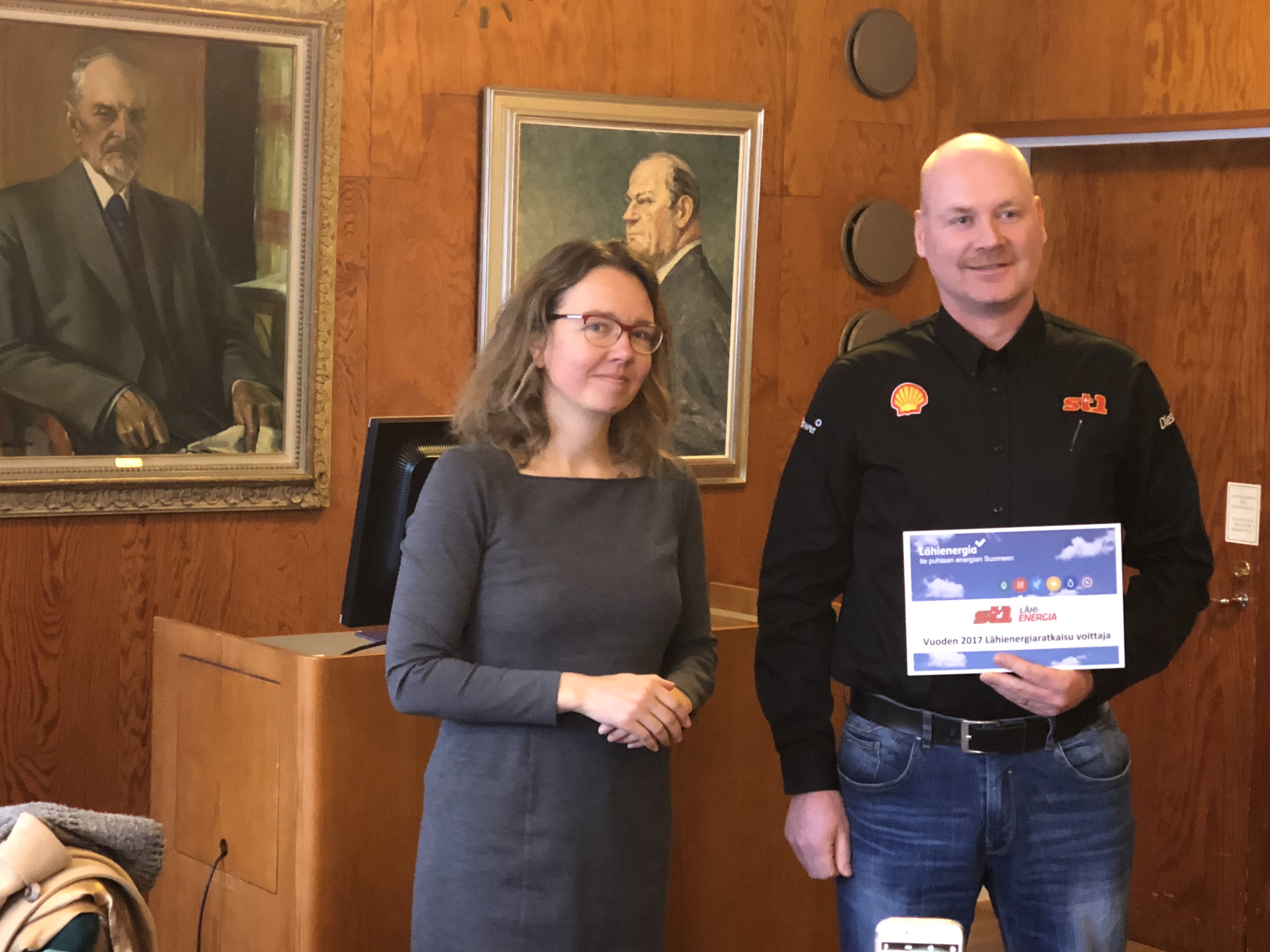The Finnish Clean Energy Solution Competition was arranged for the first time in 2017, attracting plenty of interest by a large number of high-quality projects and companies. The jury awarded first prize to St1 Lähienergia Oy, with housing company As Oy Tampereen Pohjolankatu 18-20 with utilities company Tampereen Sähkölaitos receiving a commendation for its two-way district heating.
The Finnish Clean Energy Association’s Executive Director Tapio Tuomi opened the award ceremony on 31 January 2018, saying “The reduction of CO2 emissions in energy production and consumption and the energy debate in general has focused for a long time on electrical systems and recently also on traffic systems. Production of heating/cooling has received less attention, although it accounts for a major percentage of emissions, and new alternatives are emerging to reduce emissions by improving energy efficiency and adopting new technologies. It was therefore delightful to see that 80% of the entries were related to heating.”
The jury’s grounds for their choice were as follows: The jury was impressed by St1 Lähienergia’s carefully considered concept with its comprehensive content. The concept fulfilled the assessment criteria better than any other entry. The energy produced and used by the service is entirely free of CO2 emissions.
St1 Lähienergia’s CEO Kristian Savela comments on the winning service: “St1 Lähienergia’s plant heats the property without CO2 emissions at a lower cost than heating systems based on fossil fuels, traditional district heating or direct electric heating. The plant also utilises local energy from the ground and outgoing air, making use of heat wells, heat pumps and heat recovery units. The energy used by the heating plant is allocated from wind energy production.”
Despite having only been used for a short period, the concept has proved to meet customers’ needs well, and buying it has been made easy. The service is used by almost 100 customers, and the services produces a heating effect of 7.8 MW. From the customers’ viewpoint, heating is a service, and the service provider takes care of the system maintenance and investments. This makes it easier to make a decision: environmental and financial factors are easy to assess, you there is no need to make technical comparisons between alternatives.
“The principle with the service is to bring 100% renewable energy to customers using diversified energy solutions and at lower cost, without the customer having to invest their own money. The seller commits to producing energy to the customer at a certain price (the price changes according to the property’s maintenance index), and the customer has at any time the right to buy the plant at the agreed price, taking into account an age reduction. In practice this is a case of a life cycle model, in which it is the seller’s interest to build a plant which is as energy-efficient as possible, because the seller’s service does not actually start until installation has been completed. The seller has continuous services business, which enables continuous energy efficiency development. The customer gets energy at a lower price, smaller consumption and also reduces CO2 emissions. Thanks to the concept, customers can be sure that the supplier will build the best possible plant, without having to worry about financing, technology or operational risk. And once the production reports seem convincing enough, customers may buy the plant to themselves,” says Savela.
Tarja Teppo, handing out the awards on behalf of the jury, said that “The competition created a number of excellent clean energy solutions, projects and implementations. It was good that jury consisted of persons representing different viewpoints, because this created a diversified debate out the entries.”
The 2017 Finnish Clean Energy Solution Competition jury consisted of MP Harri Jaskari (National Coalition Party, chair of the parliamentary energy reform group), CFO and partner Tarja Teppo (Loudspring Oyj) and Professor Eva Heiskanen (Consumer Society Research Centre of the University of Helsinki). The jury’s secretary was Tapio Tuomi, secretary of the board of the Finnish Clean Energy Association.


